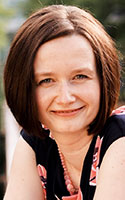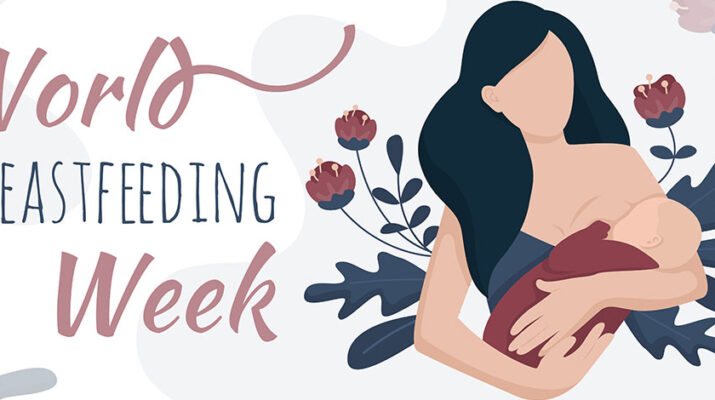Mothers, as well as babies, can benefit from breastfeeding, experts say
Megan Plete Postol

World Breastfeeding Week is marked annually from August 1 to 7. The goal is to inform, anchor, engage and galvanize action on breastfeeding and related issues.
Nurse Anna Mroczek is the president of the Mohawk Valley Breastfeeding Network and the owner of Mohawk Valley Lactation.
“Breastfeeding is a physiological norm for mothers and babies that simply can’t be replicated by other modes of feeding,” Mroczek said. “Breastfeeding is so much more than just a perfect food for a newborn baby. Breastfeeding enhances a newborn baby’s physiological, psychosocial and neurological development. Breastfeeding is about security, safety, bonding, trust. Mother’s chest is infant’s habitat when all of their needs are being met. Mother’s milk is a living fluid that constantly changes and adapts to changing needs of her baby.”
Breastfeeding has many well-documented benefits.
“We are only beginning to understand breastfeeding’s profound impact on the health of mother and baby,” Mroczek said.
Studies have shown that breastfeeding reduces an infants chance of many illnesses, including diabetes, atopic dermatitis, gastroenteritis, asthma, certain allergic diseases, respiratory tract infection, obesity, necrotizing enterocolitis, certain cancers, and sudden infant death syndrome. The Cleveland Clinic reports that breastfed babies have stronger immune systems, less gastrointestinal issues, fewer colds and respiratory illnesses like pneumonia, respiratory syncytial virus and whooping cough, fewer ear infections, fewer case of bacterial meningitis, better vision, lower rates of infant mortality, less illness overall and less hospitalization.
Benefits extend to nursing mothers, too. Mothers that breastfeed have a reduced chance of developing Type 2 diabetes, rheumatoid arthritis, and cardiovascular disease, including high blood pressure and high cholesterol, and certain cancers, such as breast cancer and ovarian cancer.
Breastmilk contains many compounds not found in formula milk, that are impossible to replicate outside of human body, Mroczek said. These are hormones, growth factors, immune factors, anti-inflammatory compounds, anti-viral factors, anti-bacterial factors, digestive enzymes, and transporters.
Mroczek suggests that mothers take time before the birth to think about what breastfeeding will entail and how to ease the transition.
“I would encourage mothers to consider what is important in breastfeeding for them individually,” she said. “What are her short-term and long-term goals, what are some challenges that she might be faced with? Will she be returning to work? Is she in the middle of house remodeling, moving? Can she count on her family’s support? Did she have the conversation with her loved one about the support she is looking for during birth and postpartum? What are her strengths and what can she do today to make breastfeeding possible, easier?”
Mothers can make the breastfeeding experience easier by seeking support.
“I would encourage mothers to surround herself with other breastfeeding mothers and talk about their experiences,” Mroczek said. “This can be done by attending one of the local Susie’s Breastfeeding Café. This is the mother’s support group that currently meets four times a month via Zoom and in-person at Faxton hospital. I would encourage them to learn about physiological birth and empower themselves to go into labor and breastfeeding with confidence rather than fear. Up-to-date information on all the meetings we offer can be found on the Susie’s Breastfeeding Café Facebook page and in the Breastfeeding Café by Mohawk Valley Breastfeeding Network Facebook group.”
There are many avenues for support in Central New York. Mroczek suggests the following:
• Susie’s Breastfeeding Café—Support group for pregnant and nursing mothers, Facebook group, in person meetings, virtual meetings through Zoom.
• Mohawk Valley Lactation—Private virtual, in person at home, (soon in office) lactation consultations and classes. Insurance coverage through Lactation Network.
• Milk@Faith—Variety of services to help with breastfeeding, birth, and parenting needs.
• Manger Born Doula—Breastfeeding counseling, birth education and doula supports.
• Nascentia Health—Provides comprehensive home care services to expectant mothers and children throughout Central New York.
• WIC—Nutrition education, breastfeeding support, referrals and a variety of nutritious foods to low-income pregnant, breastfeeding or postpartum women, infants and children up to age five to promote and support good health.
• MVBN Mohawk Valley Breastfeeding Network—Non-profit organization whose focus is on promoting, encouraging and educating families and healthcare professionals about the importance and value of breastfeeding.
• ICAN Healthy Families—provides individualized and non-traditional services and care to the highest risk individuals and families with social, emotional, mental health and behavioral challenges. Healthy Families of Oneida County services are home-based and are designed to support expectant families and parents in making a healthy home as they experience pregnancy and anticipate the birth of a new child.
• Neighborhood Center—Community Health Worker is a free home visiting program serving Oneida and Herkimer counties. They work with women before having a baby, during pregnancy, after pregnancy or between pregnancies.
Mothers can also attend breastfeeding classes offered by local hospitals. MVHS offers a free monthly class open to public on the first Saturday of each month. Parents can register by calling 315-624-4782. Mothers seeking a private, one-on-one prenatal session can schedule one with a local lactation consultant or breastfeeding specialist. Currently these are being offered locally by Mroczek through her business, Mohawk Valley Lactation, or with Jocelyn Sample of Milk@Faith, or Ashley Angram of Manger Born Doula.
“Becoming a mother is a life-changing experience and often mothers and babies just need time to recover and learn to understand each other and discover instincts that they didn’t know existed,” Mroczek said. “Initially mother might need to adjust her expectations and learn what is physiologically normal for her and the baby. Infant behaviors can seem confusing at first and mothers are left doubting if all is OK with her body and her baby. This is the time when a mother needs emotional support and care.”

